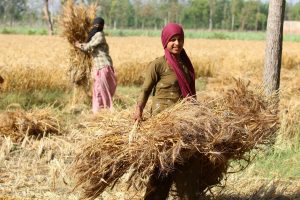India
Wheat Import Duty Likely To Be Doubled
In a move to protect local farmers from cheap imported wheat, the Government is likely to increase the import duty on wheat to 40 percent from the current 20 percent according to food ministry officials.
Executives from the industry say that wheat imported from Ukraine and Russia is currently available for about Rs 22,300 a tonne after paying the 20 percent duty and clearing charges. Since the wheat varieties grown in Madhya Pradesh is currently sold at Rs 22,800 a tonne in Bengaluru, there is an increasing competition for the local produce.
It is to be noted that the country is set to produce a record 98.61 million tonnes of wheat in 2017-18 crop year according to the government’s third advance estimate. With such an abundance of wheat being produced, the cheaper imports could hit Indian farmers hard, the food ministry officials cited earlier told ET. The meeting was attended by secretaries and officials of the ministries of food, consumer affairs, agriculture, finance, and commerce.
“There is a huge crop in the country and the government will ensure that farmers get remunerative prices,” said another official and added that the government is looking into doubling the import duty on wheat as the harvesting period is about to end soon.
India imported 1.48 million tonnes of wheat in the year 2017-2018 when compared to 5.75 million tonnes of wheat in 2016-17. The Food Corporation of India (FCI) and other state agencies have together procured 33.3 million tonnes of wheat till date in the current procurement season. FCI’s carryover stock amounts up to 13 million tonnes. “The government has enough stock against the requirement of 30 million tonnes for the various welfare schemes and for the minimum buffer,” reported a trader.
“The increase in import duty will force millers to increase domestic buying, which may increase prices,” a commodity broker from Chennai told ET. He also added that if the import duty in increased, them millers from south India who usually get their wheat from countries like Russia, Ukraine, and Australia will turn away from imports and will focus on local produce.





















